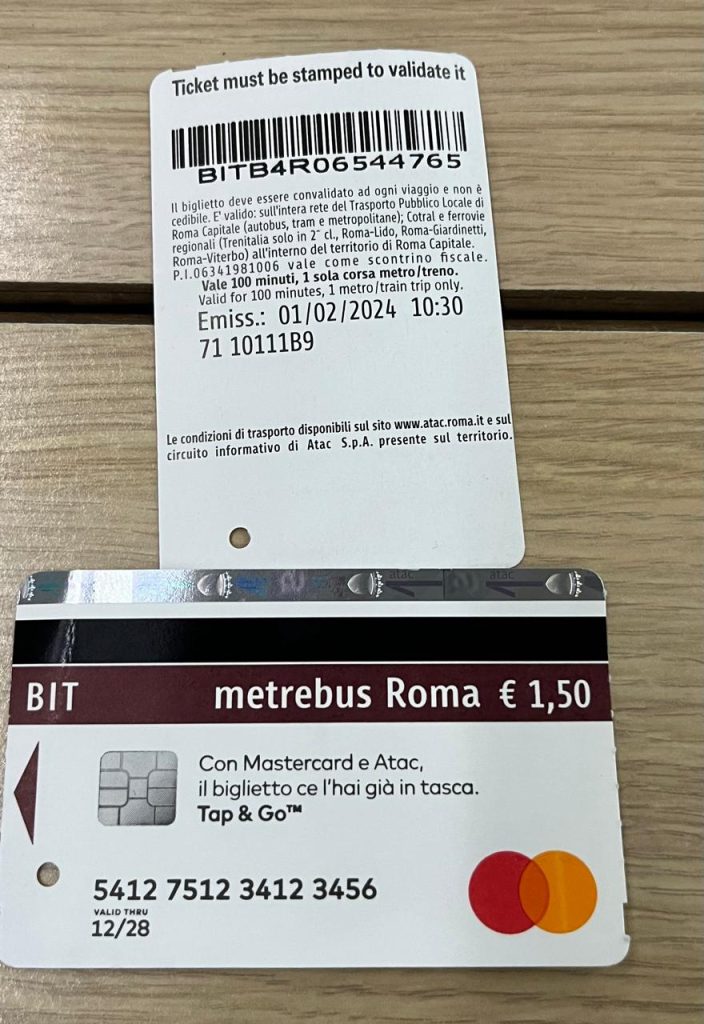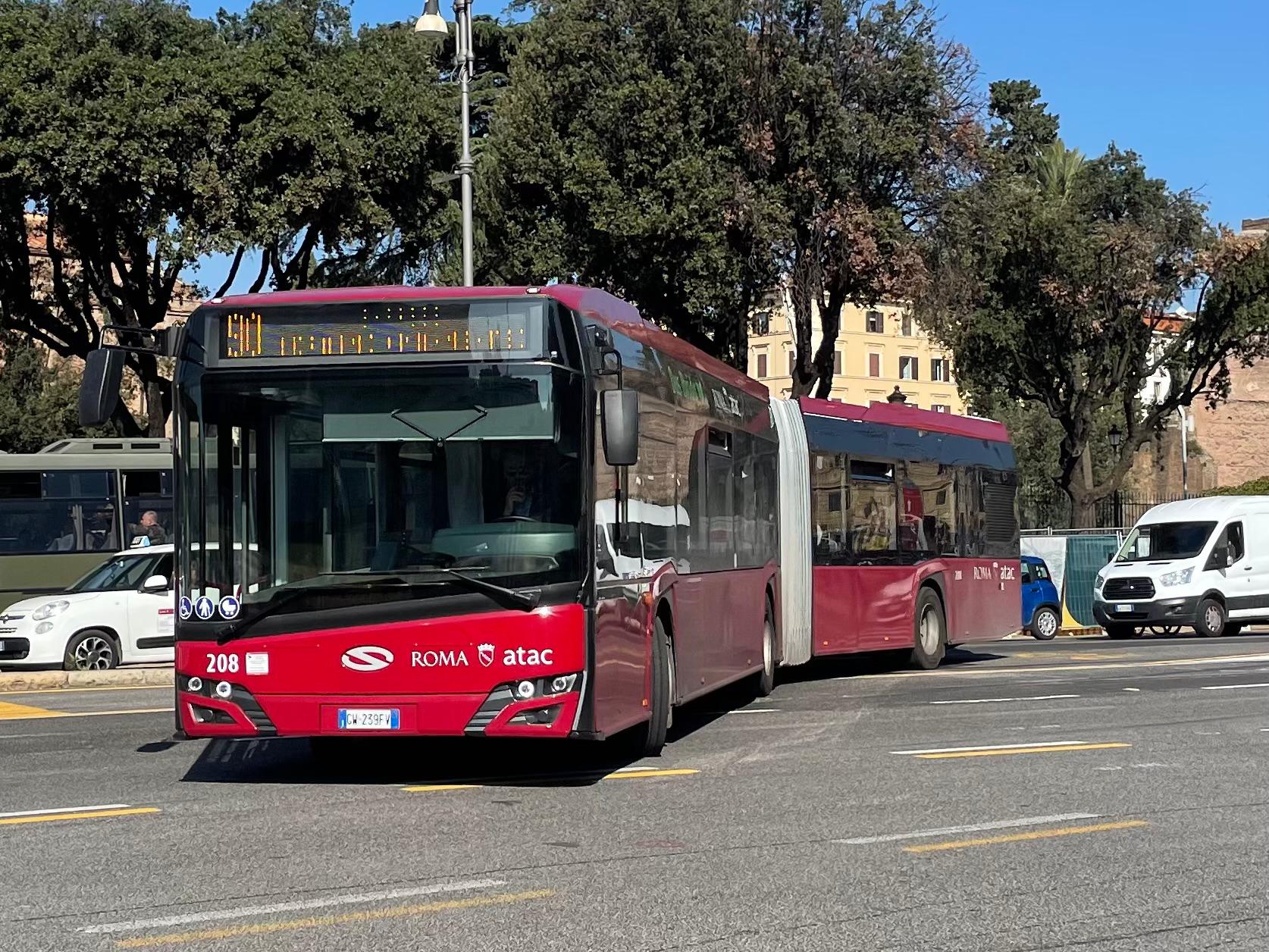After spending five unforgettable nights in Rome, I still didn’t want to leave. But Florence was calling. I was traveling with my wife, and we were both excited: she’s an art lover, and I couldn’t wait to try an authentic Tuscan steak. We woke up early, eager to catch our train to Florence. The bags were packed, the apartment was clean, and our tickets were booked.
We were staying in Trastevere, very close to Castel Sant’Angelo, and needed to make our way to Roma Termini station. Unfortunately, it wasn’t within walking distance. A taxi was an option, but if you’ve been to Rome, you know taxis can be expensive and not always reliable. And unlike in many other cities, rideshare apps like Uber don’t dominate Italy. In fact, Uber in Rome usually just connects you to a more expensive type of private car hire called Uber Black. It’s not the affordable everyday ride you might be used to.
So, I convinced my wife that we should take the bus and experience Rome like locals. After all, public transport is often the best way to understand a city and its people. You get to see neighborhoods outside the tourist core, watch commuters go about their daily lives, and you often save time and money.
The Research I Had Done

Before our trip, I had done a fair amount of research on public transportation in Italy, drawing from my experience in France the year before. While in Paris, I only used the metro and trains—never a bus—and I assumed Rome would be similar. The Paris metro is straightforward, and there are clear gates where you scan your ticket. It’s hard to make a mistake.
But Rome is a different beast entirely. I was wrong to assume it would be the same.
Rome’s metro network isn’t nearly as extensive as Paris’s, and that’s largely because of all the ancient ruins buried beneath the surface. Every time they dig underground to build a new metro line, they uncover some priceless artifact or historic foundation, which brings construction to a grinding halt. As a result, buses are more common and more necessary in Rome than metros or trams.
One key thing I learned during my research was the need to validate your ticket. You buy a ticket, then insert it into a small machine that stamps it with the date and time. This activates your ticket. Without that timestamp, the ticket is considered unused—and unusable. But then, I thought that only applies to metros and trains.
Already in Rome, I reached out to our Airbnb host to ask if a nearby metro station could get us to Roma Termini. They said no, but recommended bus number 64. I admitted we were a bit nervous about buses, especially because of the pickpocket warnings we’d seen online. The host reassured us: just have valid tickets, keep your belongings secure, especially when boarding and exiting, and you’ll be fine.
Time to Catch the Bus
After checking out and locking the apartment door, I opened Google Maps and input our destination. The nearest stop for Bus 64 was just a five-minute walk away. Before heading there, we bought two tickets at a nearby newsstand. They cost €1.50 each and were printed on thin paper. The man behind the counter handed them over without comment.

The bus arrived a few minutes later. It was already crowded, but we managed to get on with our large backpacks and stood near the front door, close to the driver. It was a tight squeeze, and we were focused on finding a place to stand without bumping into anyone.
Remember that detail—we boarded through the front. That part will matter in just a moment.
“Hand Your Passport and Get Off the Bus With Me”
Not even five minutes into the ride, the bus stopped at a busy intersection. Three uniformed inspectors stepped on. No need for a translator—they were clearly there to check tickets. They had clipboards and handheld scanners, and you could sense the mood change on the bus.
I asked my wife to hand me the tickets, which she had in her purse. I confidently handed both to the inspector. He looked at the front, then turned them over and pointed to the back, where it clearly said in Italian and English: “Ticket must be validated to be valid.”
My heart sank.
I tried to explain: “The guy at the newsstand must have forgotten to stamp it for me. We’re tourists. I wouldn’t come all the way here to cheat a €1.50 bus ride.”
“You stamp it yourself,” the inspector said, motioning toward a small yellow box at the back of the bus. It was the validation machine, tucked away where we hadn’t even looked.
Before I could make a move to go stamp it now, he shook his head and said, “It’s too late. You both get off the bus with me at the next stop.”
I looked at my wife. Her eyes widened in disbelief. Passengers stared at us—some with sympathy, some with curiosity. The inspector then added, almost as a command: “Hand your passports.”
It was a surreal moment. I couldn’t believe we were being asked to surrender our passports over a bus ticket. But this wasn’t a joke. We weren’t alone either. Several other tourists, easily spotted by their suitcases and wide-eyed expressions, were also caught. I even saw an elderly couple trying to plead their case, speaking in broken Italian. The inspectors didn’t budge.
The Fines

At the next stop, we were led off the bus. There, on the sidewalk, we were lined up while the inspectors issued fines one by one. It felt like a school detention line.
The inspector who took our passports explained that we had broken the law and would be fined. He spoke clear English, but without much emotion.
“If you pay now, it’s half the fine. If you pay later, it will double. How do you want to proceed?”
I had assumed the fine was €50 total. Turns out, €50 was the discounted rate. The full fine? €100 each.
We were already cutting it close for our train to Florence. I didn’t want to gamble on anything escalating. I pulled out my credit card and paid right there on the portable machine: €50 for me, €50 for my wife.
When the officer handed her the receipt, she was so upset she teared up. She absolutely hates losing money—especially when it feels unfair.
One of the inspectors said, “We are only doing our job. We can’t choose who to forgive. The rules apply to everyone.”
And you know what? I believed him. It’s probably not easy being the person who ruins someone’s morning, but they didn’t make the rules—they just enforce them. If they let tourists off with a warning, word would get around fast. Then locals might stop validating too. It would collapse the entire fare-based trust system.
Never Beg
If you ever find yourself in this situation, don’t beg. The inspectors won’t budge. They always work in groups, so even if one of them has some sympathy, the others will hold the line. And even if all three do sympathize, it doesn’t matter. They’re not allowed to ignore the infraction. The system doesn’t give them that freedom.
Some of them may even come across as cold or robotic. I think it’s because they’ve heard every excuse in the book—“I didn’t know,” “I’m a tourist,” “The machine didn’t work,” “The driver didn’t remind me”—and they have to stay detached. It’s not personal.
What If You Can’t or Won’t Pay?
You don’t have to pay on the spot. If you can’t or won’t, they’ll issue a formal citation to your name using your ID or passport. That fine will be sent to your home address—assuming they believe it’s real—and it will be higher than the on-the-spot rate.
If you fail to pay it later, it can complicate things. If you return to Italy in the future and are flagged in the system, you may be required to pay the fine with additional interest or fees. In extreme cases, ignoring multiple infractions could become a legal issue.
If you flat-out refuse to hand over ID or cooperate, the inspectors will call the police. You can be fined further for non-compliance, and in rare cases, it may even escalate to a legal matter.
Bottom line: just pay the fine, learn the lesson, and move on with your trip.
Back to the Bus
We got on the next bus, validated our tickets immediately, but oddly, the machine wouldn’t stamp them. We tried inserting them several times, but no luck. My wife suggested we get off and buy new ones, but I told her we couldn’t afford to miss our train.
We already had the receipts for the fines—I figured the inspectors had either stamped them or that the tickets were no longer necessary since we had just paid €100 to make up for the error.
No inspectors came on this time, and we arrived at Roma Termini with about 15 minutes to spare. We sprinted through the station, found our platform, and boarded our train just five minutes before departure.
Lesson Learned
That stressful morning definitely put a damper on our day. But looking back now, we talk about it like it was just another travel story—and maybe even a valuable one. One of those stories you laugh about later. Maybe.
Italy remains our favorite country to visit. The people, the food, the history, the landscapes—nothing else compares. But if you take one lesson from our mistake, it’s this:
Always validate your bus or train ticket. Immediately. No matter what. Even if you bought it. Even if you’re just going a few stops. No exceptions.

